The pretérito indefinido in Spanish is one of the past tenses of the indicative mood that causes the most headaches for students of Spanish as a foreign language.
That’s why today we’re going to do a comprehensive review of the pretérito indefinido: forms of regular and irregular verbs, uses, and the most common time markers.
Ready to learn? Let’s get started! 💪
The pretérito indefinido (also called pretérito perfecto simple) is a verbal tense of the indicative mood used to talk about past actions that are considered as complete and isolated events in time. In other words, it refers to events that happened in the past and have no relation to the present (the main difference from the present perfect). Often, it’s used concurrently with the Pretérito imperfecto.
When do we use the pretérito indefinido?
- Specific past actions. For example, those that happened only once. Example: El verano pasado fui de vacaciones a Australia.
- Successive actions (one after the other). Example: Ayer fui al pueblo. Visité a mis padres y comimos juntos.
- Past actions for which we know when they start and when they finish. Example: El fin de semana pasado fui de viaje con mis primos. Visitamos muchos lugares interesantes.
- Past actions that interrupt another action in progress at that moment in the past (this action is expressed using the pretérito imperfecto). For example: Estaba en la ducha cuando sonó el teléfono.
The form of the pretérito indefinido:
Pretérito indefinido. Regular verbs:
To the root of the verb (the part from which we remove -ar, -er, -ir), the following endings are added. For verbs ending in -er and -ir, the endings are the same:
-ar ➡️ -é, -aste, -ó, -amos, -asteis, -aron
-er/-ir ➡️ -í, -iste, -ió, -imos, -isteis, -ieron.
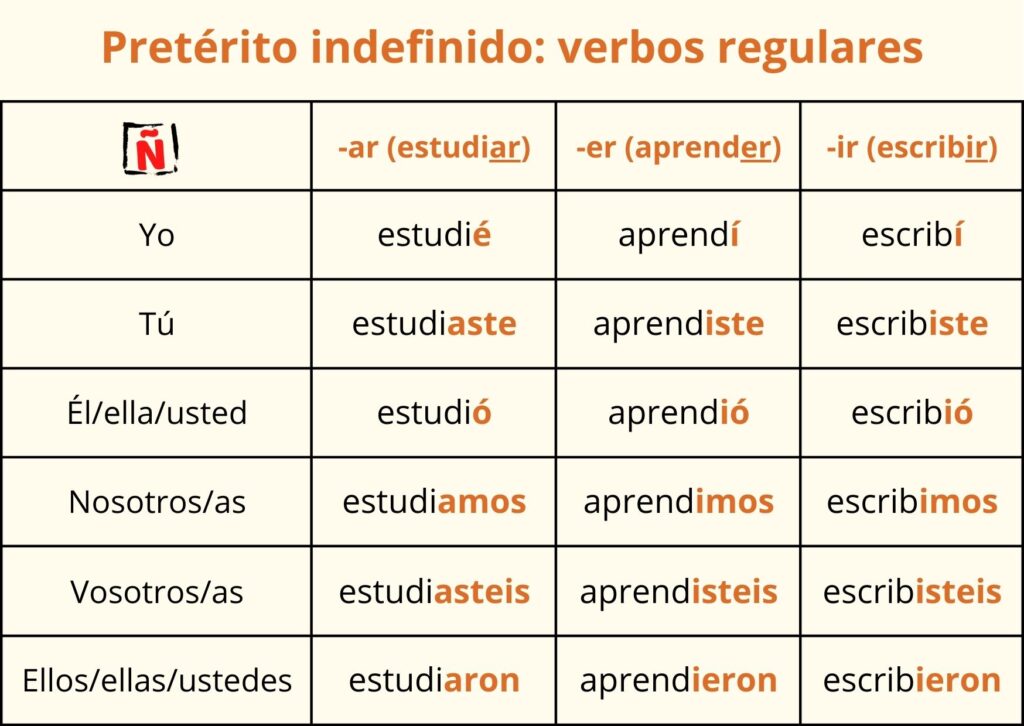
Reflexive verbs:
The reflexive pronoun (me, te, se, nos, os, se) is always placed before the verb, and the verb is conjugated in the pretérito indefinido.
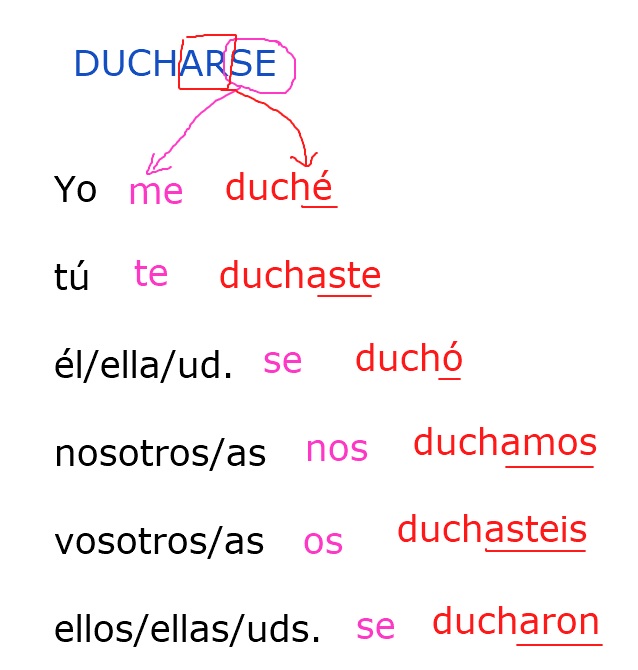
Pretérito indefinido. Irregular Verbs:
1. Completely Irregular Verbs:
Ser/Ir (they are the same in the pretérito indefinido)
Yo fui
Tú fuiste
Él/ella/usted fue
Nosotros/as fuimos
Vosotros/as fuisteis
Ellos/ellas/ustedes fueron
Dar (to give)
Yo di
Tú diste
Él/ella/usted dio
Nosotros/as dimos
Vosotros/as disteis
Ellos/ellas/ustedes dieron
2. Verbs with a Vowel Change:
Many third-conjugation (-ir) verbs change the vowel in the third person singular (él/ella/usted) and the third person plural (ellos/ellas/ustedes).
Change e > i
⬇️
PEDIR (to ask)
Yo pedí
Tú pediste
Él/ella/ud. pidió
Nosotros/as pedimos
Vosotros/as pedisteis
Ellos/ellas/uds. pidieron
Other verbs that are conjugated the same in the pretérito indefinido: corregir, arrepentirse, mentir, medir, divertirse, preferir, reír, seguir, repetir, servir, hervir, herir, elegir, invertir, perseguir, sentir, vestirse…
Change o > u
⬇️
DORMIR (to sleep)
Yo dormí
Tú dormiste
Él/ella/ud. durmió
Nosotros/as dormimos
Vosotros/as dormisteis
Ellos/ellas/uds. durmieron
Other verbs: morir
3. Verbs with an Irregular Stem:
The root of the verb is the part of the infinitive without -ar, -er, -ir. In regular verbs, it doesn’t change, but in the following cases, it does, and that’s why they are irregular verbs.
To these irregular roots, we add: -e, -iste, -o, -imos, -isteis, -ieron.
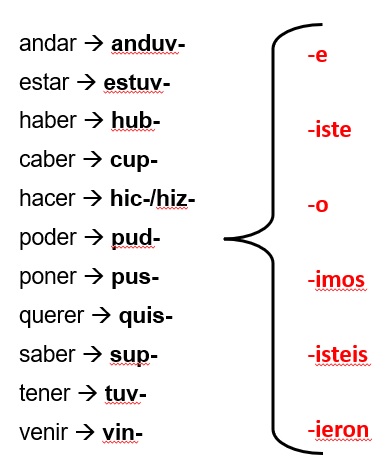
The following verbs have a root that ends in -j:
To these roots, we add: -e, -iste, -o, -imos, -isteis, *-eron (not ieron).
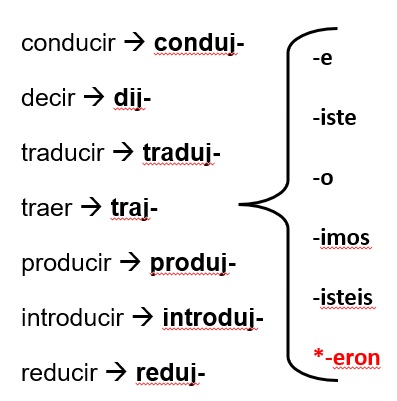
4. Verbs Ending in -car, -gar, -guar, and -zar:
They change the spelling in the first person of the singular (yo) to maintain pronunciation.
-car ➔ -qué ➡️ tocar – toqué, buscar – busqué
-gar ➔ -gué ➡️ jugar – jugué, apagar – apagué
-guar ➔ -güé ➡️ averiguar – averigüé, amortiguar – amortigüé
-zar ➔ -cé ➡️ almorzar – almorcé, empezar – empecé
5. Verbs Ending in Vowel + -er/-ir:
These verbs change i to y in the third persons of the singular and plural (él/ella/usted and ellos/ellas/ustedes) for pronunciation reasons.
leer ➔ leyó / leyeron (not leió/leieron)
huir ➔ huyó / huyeron
construir ➔ construyó / construyeron
oír ➔ oyó / oyeron
Other similar verbs: caer, poseer, destruir, influir, incluir..
Time expressions for the pretérito indefinido:
It is often used with expressions like:
ayer, anoche, anteayer
el otro día, la otra semana…
la semana pasada, el mes/año pasado, el verano pasado…
fechas (el 12 de octubre, en 1986…)
hace + tiempo (hace dos años, hace tres semanas…).
Did you find this explanation useful? On our Facebook, you’ll find a helpful infographic summarizing this explanation. You can view and download it here.
In the next post, we will explain the pretérito imperfecto. Don’t miss it!
You can leave your questions, and we will respond as soon as possible. Don’t forget to share! 😊 😊

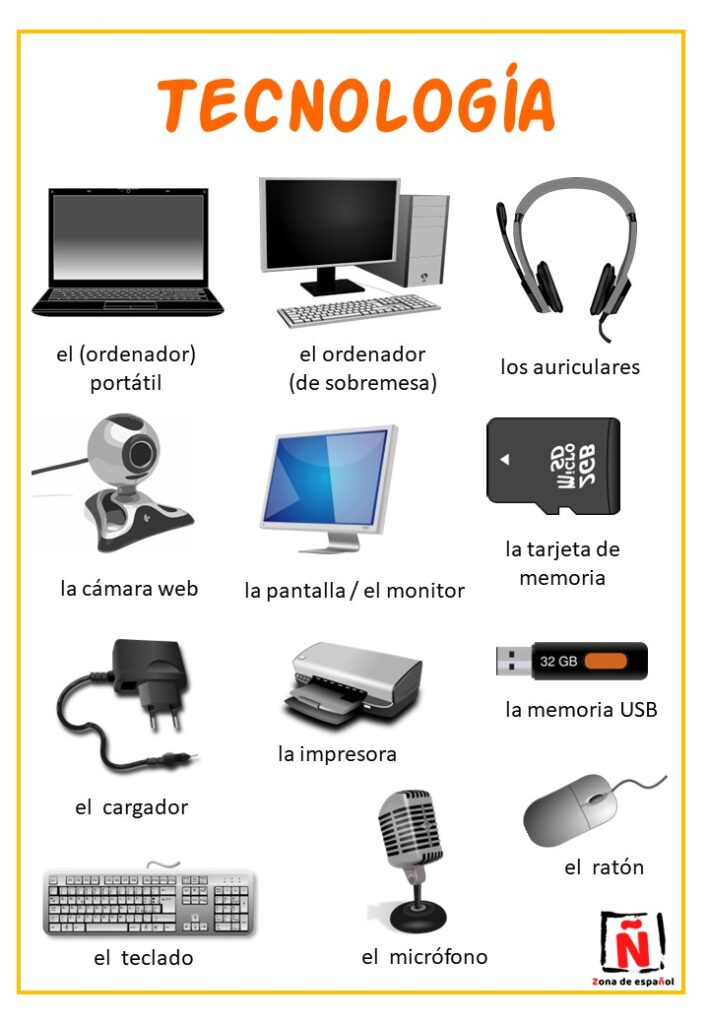
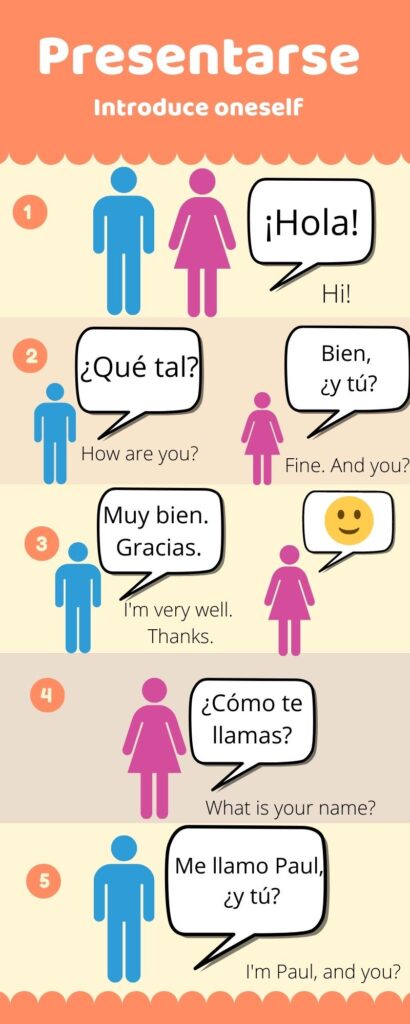



Me gusta la explicación de preterito indefinido
¡Muchas gracias! No te pierdas la siguiente, que va a ser la explicación del pretérito imperfecto.